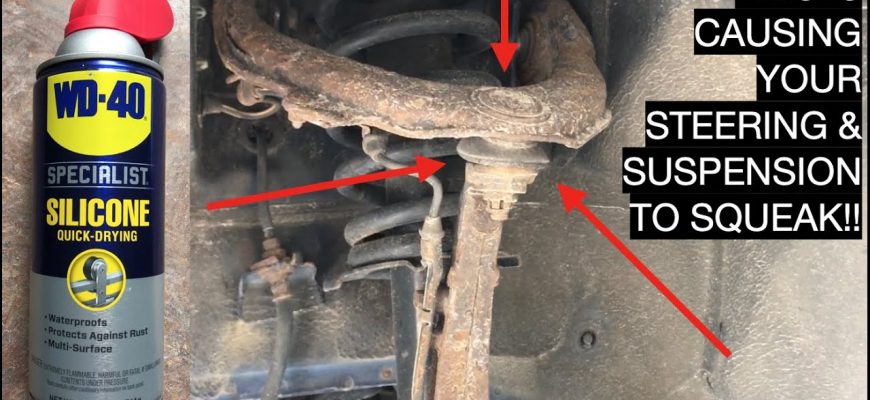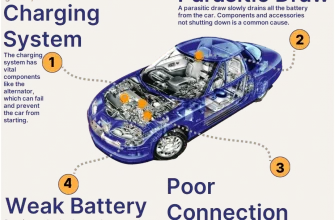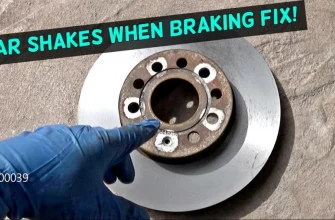Every driver knows the unsettling feeling of hearing unexpected noises from their vehicle‚ especially when turning. Those squeaks and creaks can lead to a flurry of questions and concerns. Is it serious? Could it be expensive? In this guide‚ we’ll explore how to diagnose and fix those pesky car squeaks during turns‚ ensuring that your ride remains smooth and safe.
Understanding the Causes
Before you can fix the problem‚ it’s important to understand what might be causing those annoying sounds. Here are some common culprits:
- Worn-out Brake Pads: If the squeaking occurs when you apply the brakes while turning‚ it’s possible that your brake pads are worn out.
- Suspension Issues: A failing shock absorber or strut can produce squeaks‚ especially when navigating turns.
- Dry or Worn Bushings: The rubber bushings in your suspension can dry out or wear down‚ leading to squeaking sounds.
- CV Joints: If you hear a clicking or squeaking noise when turning‚ it might indicate a problem with your constant velocity joints.
- Loose or Damaged Components: Sometimes‚ loose or damaged parts in the steering or suspension systems can create squeaks;
Step-by-Step Diagnosis
Diagnosing the source of a squeak requires a systematic approach. Follow these steps to pinpoint the issue:
- Listen Carefully: Pay attention to when the noise occurs. Is it only when turning left‚ right‚ or both?
- Check for Patterns: Note if the squeak changes with speed or during braking. These details can help narrow down the cause.
- Visual Inspection: Safely lift your vehicle and inspect the suspension‚ brakes‚ and steering components for wear or damage.
- Test Drive: If possible‚ have someone else drive the vehicle while you listen closely from outside.
Fixing the Issue
Once you’ve identified the source of the squeak‚ it’s time to take action. Here are some common fixes:
- Replace Brake Pads: If worn pads are the issue‚ replacing them is essential for safety and quiet operation.
- Lubricate Components: Applying grease to bushings and joints can often eliminate squeaks caused by dryness.
- Replace Worn Parts: Any damaged components‚ such as struts or CV joints‚ should be replaced to restore functionality.
- Tighten Loose Bolts: A simple solution may be to tighten any loose bolts or screws in your suspension or steering systems.
- Seek Professional Help: If you’re not comfortable diagnosing or fixing the issue yourself‚ consult a professional mechanic.
Preventative Measures
To avoid future squeaks‚ consider these preventative measures:
- Regular Maintenance: Keep a consistent maintenance schedule for your vehicle‚ including inspections of the braking and suspension systems.
- Quality Parts: Use high-quality replacement parts that meet or exceed OEM specifications.
- Listen and Act: Don’t ignore sounds; address them promptly to prevent more significant issues down the line.
Diagnosing and fixing car squeaks during turns doesn’t have to be a daunting task. With a keen ear and a bit of investigation‚ you can often pinpoint the problem and take appropriate action. Whether you choose to tackle the repairs yourself or enlist the help of a professional‚ keeping your vehicle in top shape will ensure a smoother‚ quieter ride. Remember‚ an ounce of prevention is worth a pound of cure—stay proactive about your car’s health!










Great insights on car maintenance! The section on suspension issues really hit home for me, as I’ve been hearing those annoying sounds for weeks.
Fantastic read! The tips on visual inspection and test driving were particularly useful. I feel empowered to check my vehicle now!
This guide is incredibly helpful! I had no idea that worn-out brake pads could cause squeaking. Now I feel more confident tackling the issue!
I appreciate the step-by-step diagnosis approach. It made it so much easier to identify the problem with my car. Thank you for this informative article!
I loved how detailed this article is! Understanding the causes of squeaks has taken away a lot of my anxiety about potential repairs.
This guide is a lifesaver! Knowing that dry or worn bushings can be the culprit gives me a clear direction on what to look for. Highly recommend!